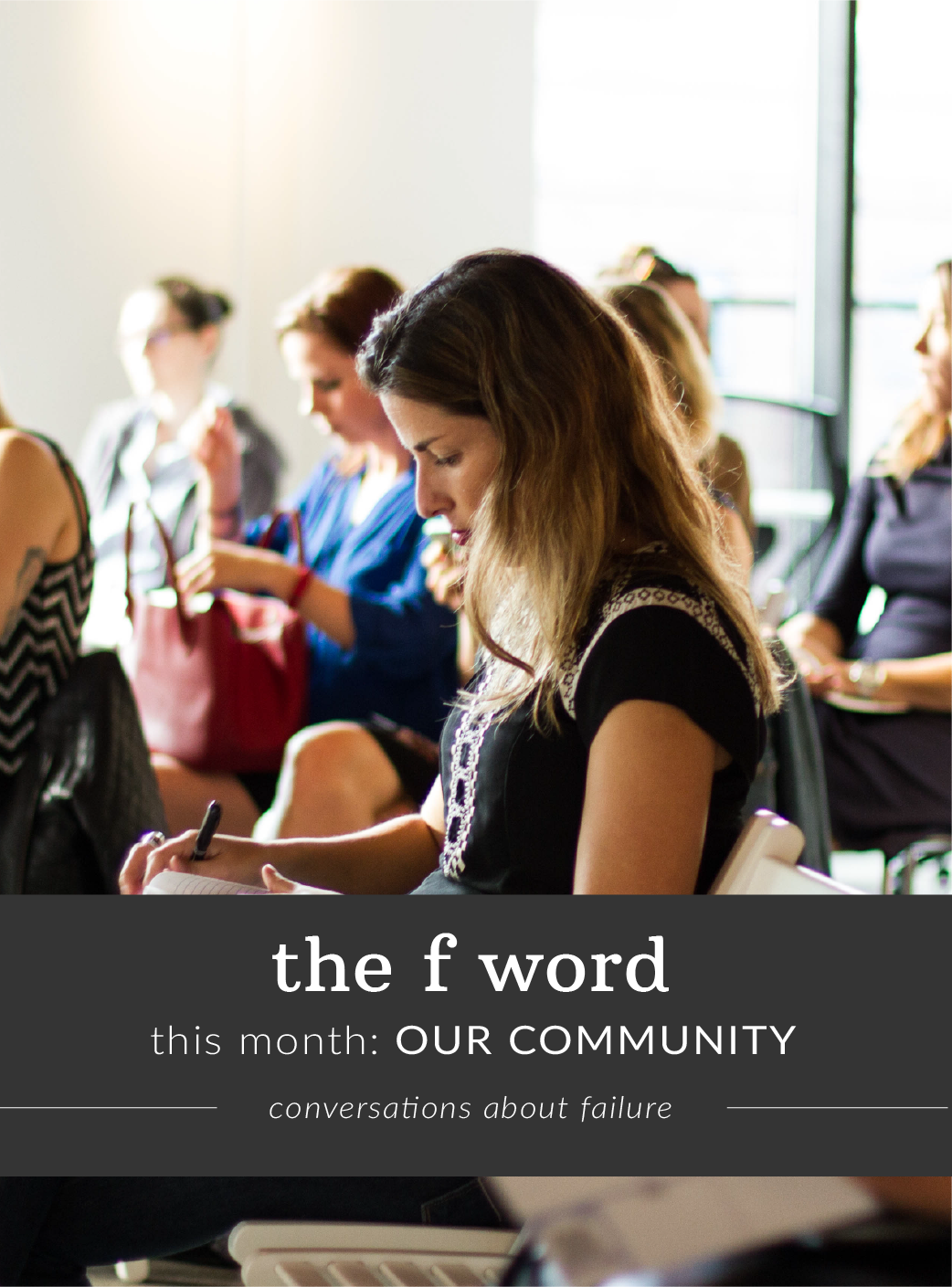The F-Word: The Final Word From Our Community
Ladies and gentlemen, we’ve made it to the final installment of The F-Word, our year-long journey into the unfiltered gritty real side of failure in the life of the entrepreneur. It’s been a wonderful experience to chat about our favourite subject with all of our interviewees, uncovering the patterns and hearing about their unique experiences with failure.
But before we were ready to close our series, we wanted to hear from all of you. So we put out the word and were bowled over by the responses. While we, unfortunately, can’t share all of your lovely answers, we’ve compiled some of them below. Learn about our community’s thoughts on the ever-messy, ever-wonderful topic of failure.
Photo Credit: Britney Gill
On what failure means to them
“In its simplest form, when a product doesn't fulfill a set expectation, but in its truest form to me, when I learned nothing from an experience. With that lens, I have truly failed very few times in my life, and even so, I sometimes think that not enough time has passed for me to see the lesson learned from that experience.” - Jana Josue
“Having learned or felt nothing at the end of an experience.” - Meredith Garritsen
“I would say failure is more of a feeling. You can feel like a failure, but it's usually only the individual themselves that thinks that. They 'feel' like they didn’t accomplish what they 'should' have. I define failure as a bad word actually. I don't think there really is such a thing. It's all meant to improve us and help us grow. I prefer 'lessons' over failure.” - Tamsen Ogden
“Constantly trapped in the 'what if'.” - Jess Ryan
On what hurts them more, failing themselves or others
“The times that I let others down. Personal failure never feels like a let down for me because I eventually see it as something to learn from and I can use the lesson or knowledge to grow as a person, but when I let someone else down it affects their life or business negatively in ways that I’m not able to change. Having someone else count on your success is one of the most stressful things in life I think” - Emma Boshart
“When you have no control and it’s a little of both.” - Ida Adamowicz
“Tough question. At the end of the day, I'd probably say when I let others down. I cannot control how others feel and take an experience. It's relatively easy for me to re-frame what appears as failures as opportunities to learn something, but when I fail and it causes someone else disappointment or pain and I cannot make it up to them in some way or talk it through with them, it's extremely painful.” - Jana Josue
“All of the above. I take failure very hard. I shut down. I hate myself, I rethink the past, on if I would have done this, everything would've turned out differently. I feel a lot of shame, I feel like I did let myself and the people I care about down. I work hard on my reputation. I don't want people to see me as weak, needy, untalented. So that's why when I fail at something, I take it extremely hard. (I know this, because I'm going through this right now.)” - Kaitlynn Jensen
“When I've let other people down because I am happy when other people are happy. In my line of work, I don't feel like things are accomplished if my clients are not more than happy.” - Isabella Sarmiento
On how they learned about failure growing up
“My parents expected a lot of me and I grew up to be too much of a perfectionist. I guess it was always a matter of achieving a specific goal, and if that goal wasn't achieved, the rest (ex. lessons learned, progress made, collaboration with others) didn't really matter.” - Tea Mihaila
“Failure was my mother yelling at me when I did something wrong or something she thought was incorrect.” - Sandra Nomoto
“My dad always says ‘failure is the pillar for success’.” - Sukhmani Purewal
“As a child and teen (and even young adult) I was under the well-intentioned, but misguided, view/impression that: failure reflects you, failure means stop, a tall mountain to climb is more likely yield a "failed" result, so approach EASIER or more sound ambitions/goals. In my mid-twenties I took on a lot of challenges that I have arguably failed at, but I wouldn't hesitate a second in saying that it shaped me, it helped build me, and it redirected my life towards where I am today. So....I wouldn't be as successful today if it weren't for all the failures everyone told me not to pursue (knowing before I did, I would fail at).” - Victoria Abadi
On why we don’t talk about failure more
“Maybe because it is seen as embarrassing. We want to keep a strong self image of ourselves, making it look like we got to where we are by ourselves and had no setbacks. Giving the illusion that you're strong independent woman.” - Kaitlynn Jensen
“Vulnerability is still perceived as a weakness.” - Jess Ryan
“I think that as a society - especially one that constantly views itself through the lens of social media only wants to look at itself through rose colored glasses. We don’t like the ugly parts of the real world that much. I think to a certain point we have become too uncomfortable with the dark parts of life - failure, sadness, loss, exclusion - but talking about it means that when it happens to you all of a sudden you have a community of people you can relate to.” - Emma Boshart
“In this modern age with social media it seems everyone has to say they are living their dreams in reality. That they are succeeding. With this culture it becomes exceedingly hard to come out and say ‘I failed’.” - Sukhmani Purewal
On how they cultivate failure resilience
“I still get pretty anxious and down on myself when I think about all the goals I set out for myself and have not achieved, so I can't say I've gotten over that. But I do have a significant other in my life who has helped me with my struggles, so I guess perhaps that's how I'm dealing with it. With his help I began to realize that all things are temporary and that I should have more faith in the unknown.” - Tea Mihaila
“By failing a lot.” - Ida Adamowicz
“It's something I'm still working on. I think it's a journey towards better management of the emotions that naturally come from feeling as though you've failed or are a 'failure'. I do my best to remind myself a failure does not define me, and is limited to the goal that was being pursued. I also keep in mind it's just live feedback, and that when you 'fail' you need to pivot and move on, or step back and gain a better perspective (and keep going). It's a combined approach of minimizing the impact it makes on me personally, as well as minimizing the amount of time it takes me to get up and get going. The goal is to whittle it all the way down to maybe 60 seconds of grief, and moving on. A huge HUGE game-changer, when it comes to failure resiliency, is where you're at personally. Whether you're spiritual, religious, meditative, whatever it is. I encourage others to work on THEMSELVES, because when you build that confidence in YOURSELF and knowing (and believing) you CAN do anything and you ARE worthy and that YOU define yourself; getting over failures happens a lot quicker and easier. Because you're not stuck in that negative self-talk. It's really difficult and often impossible to get around yourself, when you're the first obstacle. So work on you.” - Victoria Abadi
“I don't take no for an answer. I'll keep trying until the door actually shuts in my face. I also come up with back-up plans, Plan A-Z. Using this and the advice my dad gave me, there is always a way to turn failure into a positive.” - Sukhmani Purewal
On how The F-Word Series shaped their views on failure
“It gave me so much insight into other people’s journeys- not only was there so many similarities in the resilience of each entrepreneur but also in their belief in their abilities as a person. It gave me confidence to continue on my journey and to keep building my community and to keep talking about my stumbles along the way.” - Emma Boshart
“The questions helped me reflect. That there is no failure. :) Because life is a learning process.” - Serena Tang
“That I think it needs to be talked about way more often. And to stop painting everyone as perfect. There are power in numbers, when you meet other people in similar situations as you, it's very humbling.” - Kaitlynn Jensen
“It made me think a lot more on how I can talk about failure in public and private.” - Sukhmani Purewal
“I think I realized I fail pretty good! I think it's how you perceive failure - the MEANING you give it is more important than the failure itself. The failure is there only to help you improve. So it's helped me realize I'm skilled at failing. How awesome! Thank you!” - Tamsen Ogden
And with that, it’s time to close the chapter on The F-Word. It’s bittersweet, to say the least. From the bottom of all of our hearts, thanks again for engaging with us throughout this process. It’s been immensely gratifying to see and hear about the impact that reading this series has had on your lives. We hope you continue to find inspiration to take that next leap, or to share openly with a fellow entrepreneur about the sometimes heartbreaking experiences of failure so that we can all remind ourselves that we aren’t alone. The life of an entrepreneur is full of everyday failures. They can be messy, beautiful, and devastating all at once. They’re also full of rich hints at how we might succeed in the future.
Thanks for reading! It’s been a pleasure delivering you these interviews. While the series is over, our love affair with discussing failure is anything but. So if you ever want to chat about failure, we’re all ears.


